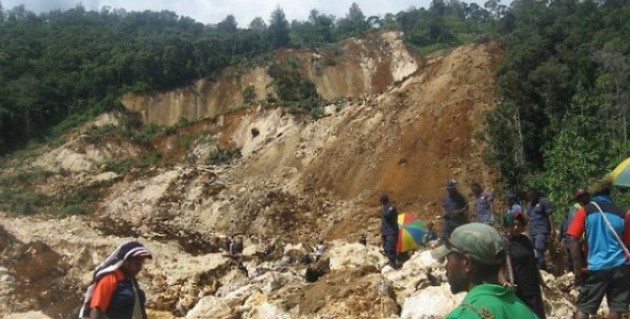One month later, what has been done for the victims of Tumbi?

When I last wrote about the Tumbi landslide on 29 January, we had no firm data on the disaster’s death toll, little humanitarian assistance had been made available to the displaced, and the national government was tight-lipped on how they would discover the landslide’s cause. Incredibly, over three weeks later little has changed. The cause and consequence (death toll) of the disaster remain unknown, while funds earmarked for relief have not been released to the victim communities.
Sadly the actions taken to date do not indicate clean hands are at play (though I am entirely prepared to stand corrected). The initial
report on the landslide, composed by the National Disaster Committee (NDC), was tainted by elementary errors, which were thoughtfully brought to light by international landslide expert,
Prof Dave Petley (subsequently, to their credit the NDC have
disowned this report). Moreover, courtesy of
pictures supplied by Ausaid, it would appear ExxonMobil was part of the NDC investigation team. While it would be unfair to assume Exxon (or their contractors) are guilty of criminal negligence, they are a suspect in the landslide. Consequently, while their assistance will be central to any thorough investigation, it is reasonable that they are kept at arms length from the inquiry.
More recent reports that PNG LNG contractors denied PNGDF/NDC investigators access to information on the landslide, if true, is not a positive sign that ExxonMobil are prepared to play a responsible role in the aftermath of this fatal disaster. Indeed, their decision last week to cancel
a planned interview with the Australian Broadcasting Commission, illustrates an unwillingness to transparently engage with civil society. Indeed, in the circumstances the questions asked of the company are quite reasonable, not only due to the proximity of the quarry to the landslide, but also because their own
independent monitors had made a series of telling remarks about project safety in 2011.
However, the failings to date are not purely those of ExxonMobil, we know that the NDC’s response has been compromised (perhaps owing to pressure from above). Indeed,
their focus over the past month has been on clearing the debris from the blocked road to allow work at the LNG project to proceed at pace, while the welfare of the victims and displaced have come in a distant second place. When frustrated landowners blocked earth moving equipment from clearing the road, the NDC it is
alleged, threatened to withdraw humanitarian assistance. If this claim is proven, this is a grave breach of international law.
Now, however, landowners, civil society, and the union movement, have rallied behind a call for a
Commission of Inquiry into the landslide, one that will be similar in scope to the
Rabaul Queen investigation (including a focus on possible criminal liability). Despite this pressure from civil society, the PNG government has yet to clearly articulate what their response is going to be. It is not unreasonable, given that a month has now passed, to expect the O’Neil government to have responded more decisively and more transparently to the victims. Indeed, the O’Neil government has illustrated they have the capacity and will to respond decisively and rapidly to disasters. However, this vigour appears to be selective in application.
Of course, perhaps civil society should remain silent, after all PNG LNG promises to generate enormous wealth, of which a small but nonetheless sizeable chunk will remain in PNG. Unfortunately, matters are not so simple. Any student of PNG’s rich history knows sweeping grievances under the rug does not resolve matters, it simply amplifies them and encourages them to transform into much more sizable and catastrophic ailments.
Consequently, if we ignore the cries of those watching their resources being grabbed by local and international agri-firms and loggers, if we turn a blind eye to the multitude of environmental crimes being committed in the name of ‘development’, if we forget that government security forces have brutalised landowners at the behest of multinationals, or if we allow industrial hazards to occur without proper investigation or response, then we plant tainted seeds that future generations will be forced to sow. They will not be thanking their forbearer’s for this debilitating burden.
Connected Resources











































